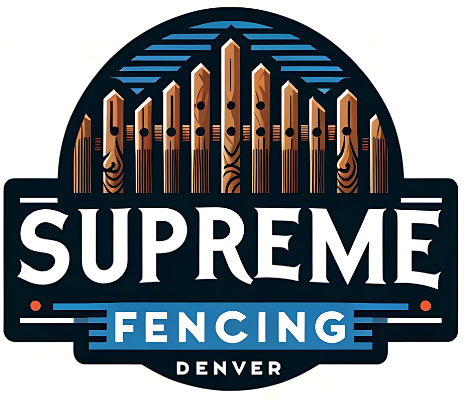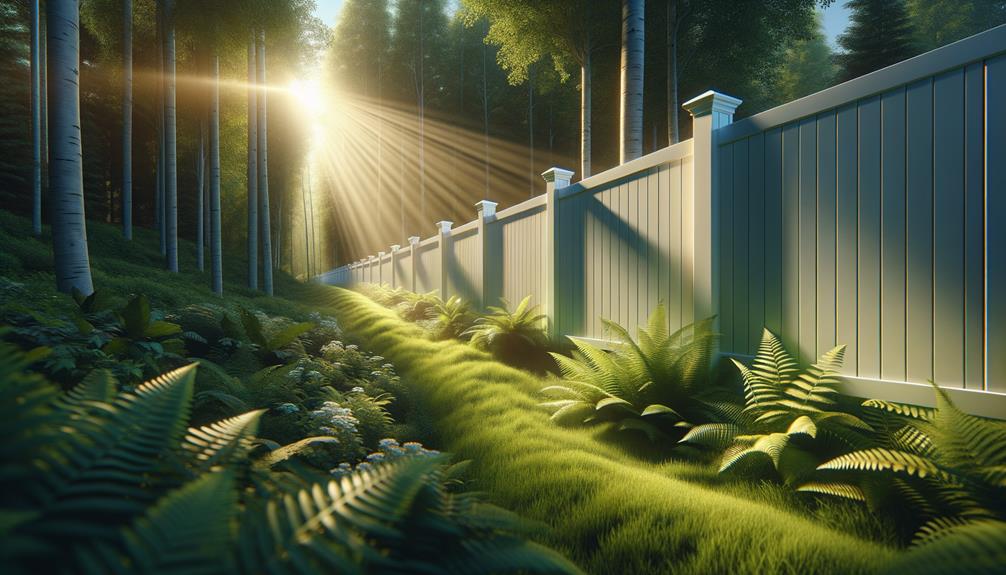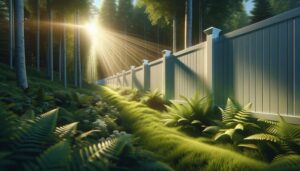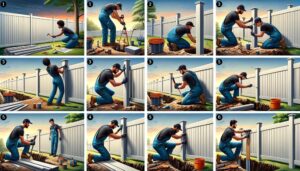Curious about the longevity of a vinyl fence? Well, let's just say that these sturdy structures have quite a reputation for standing the test of time. But how long exactly can you expect your vinyl fence to last? That's a question we're here to answer. From the factors that affect its lifespan to tips on proper installation and maintenance, we'll delve into everything you need to know to ensure your vinyl fence stays strong and durable for years to come. So, without further ado, let's jump right in and explore the world of vinyl fence longevity.
Vinyl Fence Lifespan
The lifespan of a vinyl fence varies depending on several factors, including the quality of the materials used, the installation process, and the level of maintenance provided. Vinyl fences are known for their durability and long-lasting nature. Made from a synthetic material called polyvinyl chloride (PVC), these fences are designed to withstand various weather conditions and resist damage from pests, rot, and corrosion.
One of the key benefits of vinyl fencing is its exceptional durability. Unlike traditional wood or metal fences that can warp, rot, or rust over time, vinyl fences are built to last. They are resistant to fading, cracking, and warping, making them a reliable option for homeowners looking for a low-maintenance and long-term fencing solution. Additionally, vinyl fences do not require regular painting or staining, saving you time and money on maintenance.
The quality of the materials used in vinyl fences significantly impacts their lifespan. Opting for a high-quality vinyl fence will ensure that it can withstand the test of time. Look for fences that are made from thick, impact-resistant PVC and have UV inhibitors to protect against fading and discoloration. Investing in a well-constructed vinyl fence will give you peace of mind knowing that it will endure for years to come.
Proper installation is also crucial for the longevity of a vinyl fence. Hiring a professional to install your fence ensures that it is correctly set up and structurally sound. Improper installation can lead to issues such as sagging, leaning, or gaps in the fence, which can reduce its lifespan.
Factors Affecting Vinyl Fence Longevity
To ensure the longevity of your vinyl fence, it is important to consider various factors that can impact its lifespan. Vinyl fence durability can be affected by a range of environmental factors, so it's crucial to take these into account when installing and maintaining your fence. Here are five key factors that can influence the lifespan of your vinyl fence:
- Climate: Extreme weather conditions, such as high temperatures, heavy rainfall, or prolonged exposure to sunlight, can weaken the materials of your vinyl fence over time. Consider the climate of your area and choose a vinyl fence that is suitable for your specific weather conditions.
- Moisture: Excessive moisture, such as from rain, snow, or nearby bodies of water, can lead to mold, mildew, and rotting of the fence. Ensure proper drainage around the fence to prevent water accumulation and regularly clean and inspect the fence for any signs of moisture damage.
- Soil conditions: The type and composition of the soil in your area can affect the stability and longevity of your vinyl fence. Clay soils, for example, can expand and contract with changes in moisture levels, potentially causing the fence posts to shift or become unstable. Conduct a soil analysis before installation to determine if any additional measures are needed to ensure the fence's stability.
- UV exposure: Vinyl fences can be susceptible to UV damage, which can cause fading, discoloration, and brittleness. Choose a vinyl fence with UV inhibitors or consider adding a protective coating to shield the fence from the sun's harmful rays.
- Maintenance: Regular maintenance and cleaning can greatly extend the lifespan of your vinyl fence. Remove any debris or vegetation that may accumulate around the fence, and use mild soap and water to clean the surface. Avoid using harsh chemicals or abrasive cleaning tools that may damage the vinyl.
Proper Installation Techniques
Consider these important steps for properly installing your vinyl fence to ensure its longevity and stability. When it comes to vinyl fence installation methods, there are a few key factors to keep in mind. First, make sure to properly prepare the ground where the fence will be installed. This involves clearing any debris, rocks, or roots that may interfere with the fence's foundation. Additionally, it's crucial to ensure that the ground is level and compacted to prevent any future shifting or sagging of the fence.
Next, carefully measure and mark the location of each fence post. The spacing between the posts should be consistent and adhere to the manufacturer's guidelines. This will help distribute the weight of the fence evenly and prevent any unnecessary strain on individual posts. Dig each post hole to the appropriate depth, usually around one-third of the total length of the post, and ensure that they are plumb and level.
When it comes to actually setting the posts, consider using concrete for added stability. Pouring a concrete footing around each post will help prevent shifting and ensure a strong foundation. Be sure to allow the concrete to cure fully before attaching the fence panels.
Now, let's discuss some common installation mistakes that should be avoided. One common mistake is not providing enough support for the fence posts. Without proper support, the posts can become loose over time, compromising the stability of the entire fence. Another mistake is failing to properly secure the fence panels to the posts. Using the appropriate hardware, such as screws or brackets, will help ensure that the panels stay securely in place.
Maintenance Tips for Extending Fence Lifespan
To ensure the longevity and stability of your vinyl fence, it is essential to implement regular maintenance practices that will extend its lifespan. Vinyl fence maintenance is relatively low compared to other types of fencing materials, but it still requires some attention to keep it in optimal condition. Here are some best practices for fence care:
- Cleaning: Regularly clean your vinyl fence to remove dirt, debris, and mildew. Use a mild detergent mixed with water and a soft brush or sponge to scrub the fence panels gently. Rinse thoroughly with water to avoid leaving any residue.
- Avoid Harsh Chemicals: While cleaning, avoid using harsh chemicals such as bleach or abrasive cleaners, as they can damage the vinyl surface. Stick to mild solutions to protect the fence's integrity.
- Inspect for Damage: Routinely inspect your vinyl fence for any signs of damage, such as cracks, chips, or loose components. Repair or replace damaged parts promptly to prevent further deterioration.
- Trim Vegetation: Keep plants, shrubs, and trees near the fence trimmed to prevent them from growing into or touching the vinyl panels. Overgrown vegetation can cause damage over time and may be challenging to remove without causing harm to the fence.
- Protect from Heavy Objects: Avoid leaning heavy objects against the fence, as they can cause dents or even break the panels. Ensure that children and pets do not play around or hang on the fence, as this can also lead to damage.
Signs of Wear and When to Replace a Vinyl Fence
If you notice any signs of wear on your vinyl fence, it is important to assess its condition and determine if it needs to be replaced. While vinyl fences are known for their durability, they are not immune to damage over time. By understanding the signs of wear and knowing when to replace your vinyl fence, you can ensure the safety and aesthetics of your property.
One of the most common signs of wear on a vinyl fence is discoloration. Over time, exposure to the sun's UV rays can cause the color of the vinyl to fade or change. If you notice significant discoloration, it may be time to consider replacing your fence.
Another sign of wear on a vinyl fence is cracking or splitting. This can occur due to extreme temperatures or physical impact. While small cracks or splits can sometimes be repaired with vinyl fence repair kits, larger or multiple cracks may indicate that the fence needs to be replaced.
Additionally, if you notice any loose or missing panels, it is a sign that your vinyl fence may need to be replaced. Loose panels can compromise the integrity of the fence and reduce its effectiveness in providing privacy and security.
Lastly, if you find that your vinyl fence is leaning or sagging, it is a clear indication that it needs to be replaced. This can occur due to improper installation or damage to the fence posts. A leaning or sagging fence not only looks unsightly, but it also poses a safety risk.



